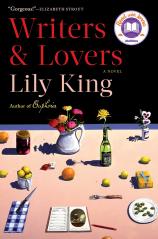Reading Group Guide
Discussion Questions
Writers & Lovers

1. Set in Boston in 1997, WRITERS & LOVERS is a transitional moment in a young woman’s life who suffers from anxiety and has trust and abandonment issues. Talk about Casey’s character, her personality, her ambitions, and her thoughts on marriage: “It was nothing I ever aspired to” (p. 72). Is she relatable? How or how not? Then discuss how your perspective of the protagonist changed over the course of the novel.
2. Geese are prominently featured in the novel and are known to be very loyal birds that mate for life and protect their young. Talk about how the geese are used as symbols in the story. Why do you think Casey chooses the geese to honor her mother’s memory? Did you also think her tribute was “weird”?
3. How do the city of Boston and the restaurant, Iris, function as characters? In what ways are the worker’s lives influenced by their place of employment? Casey comes to consider members of the staff such as Harry, Mary Hand and Victor Silva as part of her extended family. Observe how they, in turn, affect Casey and their importance to the story.
4. Casey’s mother and father have given her plenty of reasons to mistrust them. Compare Casey’s relationship with her mother with that of her father. To which parent is she closest and why? If she hadn’t discovered her father’s voyeurism (p. 278), do you think she would have forgiven her mother and moved in with her? Explain your answers.
5. On several occasions during the novel, Casey suffers extreme anxiety attacks. Persistent thoughts of her mother’s death, her father’s betrayal, crushing debt and recent medical scares leave Casey feeling like her “whole body is a bell” (p. 287). Speak about the ways her anxiety hinders her life and how she copes.
6. Throughout the novel, Muriel is often the calming voice of reason and the most stable relationship in Casey’s life. Talk about their friendship and how the author avoids the trope of toxic female friendships.
7. We’re introduced to Luke early in the story, but the repercussions of that failed relationship linger. Consider Luke’s role and how his actions affected Casey’s relationships with Oscar and, especially, Silas?
8. Take a closer look at how King uses Casey’s novel, Love and the Revolution, to explore the grieving process. Think of a time in your life when writing helped you to overcome a difficult period and share what you learned from that experience.
9. When Casey decides to commit to just dating Oscar, she says, “I’m done with the seesaw, the hot and cold, the guys who don’t know or can’t tell you what they want” (p. 199). How does your opinion of Oscar change after they start dating? Compare Casey’s relationship with Oscar to that of her relationship with Silas. What draws the couples together and what tears them apart? Do you agree with her choice of partner at the end of the novel? How would your decision have differed from that of Casey’s?
10. A major theme of the book is Casey’s past and current lovers and how those relationships impacted her. On page 239, Paco, her ex from Barcelona, says to her, “You hate men” (p. 239). Do you agree with him? Examine if King successfully addressed this one way or the other. Give examples to support your views.
11. On page 223, Casey says, “My father had this kind of drama in him, sudden surges of despair about life and wasted chances and breaks he never got. I figured that an actually successful man like Oscar would have outgrown all that crap.” What should we make of this comparison to her father and what does it say about Oscar’s character? Do you think she was being fair? Why or why not?
12. Casey remembers, “It’s Star of Ashtabula who reminds me of my mother” (p. 241). Why do you think Silas and his story come to mean so much to her?
13. We discover later in the novel that Casey isn’t her real name; her father started calling her that after his favorite poem, “Casey at the Bat.” On page 213, she tells Oscar, “That’s me. Named for a guy who struck out when it mattered most.” What does this say about her self-esteem and how she views herself? Why do you think Casey shared this part of herself with Oscar when she kept so many other things a secret?
14. Take the discussion a step further and consider why, after years of estrangement from her father, she still chooses to identify by that name? Reflect on the significance of the author revealing Casey’s real name, Camila, in the very next chapter when she is contacted by an agent hoping to represent her. What might King be trying to say about identity?
15. The theme of having a room of one’s own, the privacy to write to her fullest potential is always on Casey’s mind. In what ways does she compensate for not having an ideal place to write? How did learning about Casey’s writing process impact your reading and connection to the character? What do you think inspires Casey to write?
Guide written by Keturah Jenkins
Writers & Lovers
- Publication Date: February 16, 2021
- Genres: Fiction
- Paperback: 336 pages
- Publisher: Grove Press
- ISBN-10: 0802148549
- ISBN-13: 9780802148544







